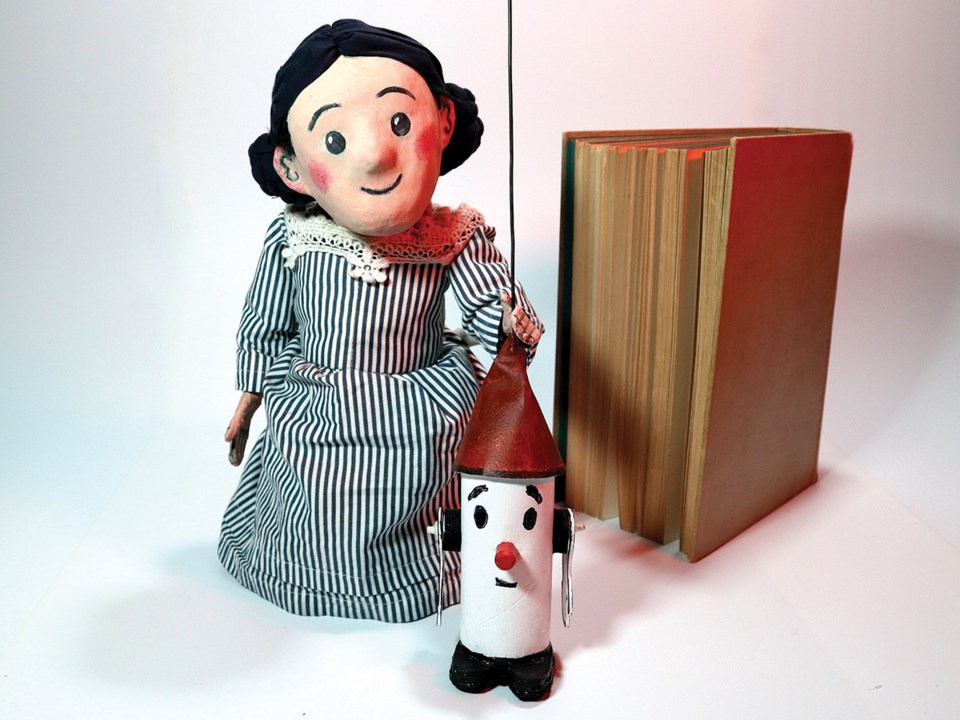An invitation by the Gibsons Public Library to deliver light-hearted children’s entertainment has led, five years later, to a historical puppet drama set to the music of Beethoven with references to Napoleon’s conquest of continental Europe.
“I wildly overshot their expectations,” said Kris Fleerackers, a filmmaker, puppetry artist and founder of Gibsons-based Fallada Puppetworks.
The 20-minute show that he delivered to library patrons in 2019 evolved into a deeply researched puppet play about the origins of classic fairy tales and a feisty girl forgotten by history. Little Sister Grimm will have its world premiere at North Vancouver’s Presentation House Theatre in April.
“It wasn’t just a rabbit hole, it was a whole rabbit warren I went down,” said Fleerackers. His childhood interest in fairy tales inspired him to learn more about the life and work of the Brothers Grimm and their only sister, Charlotte Amalie. Jacob and Wilhelm Grimm were 19th-century German folklorists who compiled a best-selling collection of stories originally spun at hearths and bedsides.
“Some of these fairy tales have mythical origins,” explained Fleerackers. “They’re basically eroded myths. When the myths became devoid of their spiritual or their religious aspects, they went into the folk culture and survived as folk tales.”
Using different types of puppets (created by Fleerackers himself), Little Sister Grimm offers a whimsical look at how the famous Grimms, with help from women around them, transferred classic fairy tales from a rapidly fading oral tradition into literary form. His script pays tribute to the power of storytelling, to women sidelined by history, and to children who face evil or injustice.
While the Brothers Grimm are out on a desperate quest for more fairy tales, their little sister Lotte sneaks a peek at an incomplete narrative in their notebook. Lotte sets out on an adventure to save its hapless heroine from doom, salvage the story, and beef up her brothers’ collection in readiness for publication.
While researching Lotte’s biography, Fleerackers tracked down 11 samples of her correspondence which are preserved in an archive in Berlin. The quantity pales in comparison to the 13,000 letters that Jacob and Wilhelm exchanged during their lifetimes, and posed an extra challenge: the documents were written in an archaic form of German script. In order to decipher the text, Fleecrackers spent weeks learning the alphabet.
“I finally came to the frustrating task of having to boil it all down again into a performance that would work for kids and for a public that doesn’t really know anything about the Grimms — or Germany in the 19th century,” he said. While the Grimms were collecting their tales, Beethoven was writing symphonies. Napoleon Bonaparte was bent on military conquest. Both are mentioned in Fleerackers’s one-man performance.
Its composition was assisted by story consultant and outside eye Atma Frans, herself an internationally published poet and literature contest finalist.
Fleerackers’s 2022 live-action puppet short film IDOL has been shown at festivals around the world and earned seven awards, including Best Animation, Best Experimental, Best Story and an Audience Award.
After its upcoming North Vancouver debut, Little Sister Grimm will appear at the Calgary Fringe Festival in August.
“I wanted to have enough of Lotte’s reality present in it and also give her enough agency to make her an interesting character and to provide a window into that time,” said Fleerackers.
Performances take place at the Presentation House Theatre on April 12 (7 p.m.), April 13 (4 p.m.), and April 14 (2 p.m.). The show is suitable for children and adults, although most appropriate for audiences aged 5 and up. Tickets are available online via phtheatre.org.





